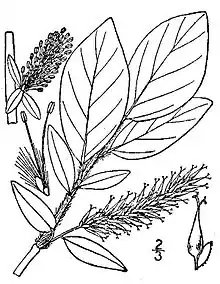| Salix barclayi | |
|---|---|
 | |
| Scientific classification | |
| Kingdom: | Plantae |
| Clade: | Tracheophytes |
| Clade: | Angiosperms |
| Clade: | Eudicots |
| Clade: | Rosids |
| Order: | Malpighiales |
| Family: | Salicaceae |
| Genus: | Salix |
| Species: | S. barclayi |
| Binomial name | |
| Salix barclayi Andersson | |
Salix barclayi, or Barclay's willow, is a species of willow native to North America, found primarily in the Northwestern area of the United States and Canada.[1] It grows near lakes and streams at elevation. It is a shrub, that can grow up to 2.5 m. (8 ft.) tall and tends to be slender. Leaves are elliptic to obovate, 2–6 cm long and 1–2.5 cm wide. Leaves are hairy when young, with midrib hairs lasting into maturity. Catkins are on short, leafy peduncles. Staminate catkins are 3 cm long with 2 stamens, while pistillate catkins are 2.5–5 cm long and glabrous.[2]
Care
This plant prefers partial sun and well-drained, moist soil to survive efficiently. This plant should grow very quickly, but tends to spread very slowly.[3]
References
- ↑ "USDA Plants Database".
- ↑ Ireland, O. Plants of the Three Sisters Region. Eugene, OR. University of Oregon. 1968. pg. 50.
- ↑ Guide, Online Plant. "Online Plant Guide - Salix barclayi / Barclay's Willow". www.onlineplantguide.com. Retrieved 2016-10-31.
This article is issued from Wikipedia. The text is licensed under Creative Commons - Attribution - Sharealike. Additional terms may apply for the media files.